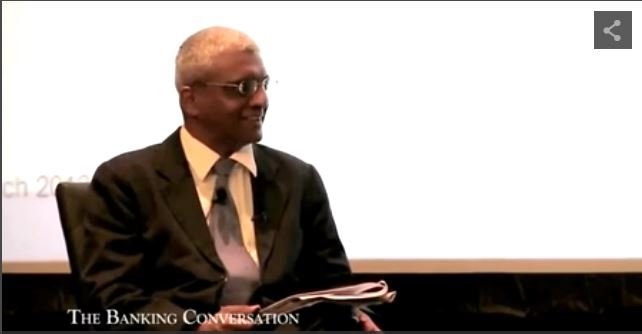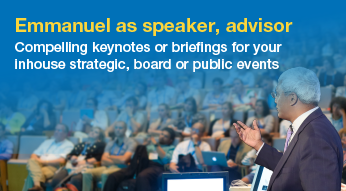(Part 1 of 3) Conversation with Teresita Sy-Coson, Chairman of SM Group and Banco De Oro, on – how banking became an integral part of the SM retail empire.
Here is the transcript of the video.
1. Difference between retail and banking businesses
Emmanuel Daniel (ED): Welcome to this very important meeting. It has always been my personal ambition to hold a conversation like this with you for many years now. I’ve known you since the 1990s when Banco De Oro was a little bank in the green belt area. At that time, would you say that you were more of a retailer than a banker?
Tessie Sy (TS): I’m still a retailer now.
ED: If you’re a retailer, the inevitable first question would be – what are the essential instincts of a retailer that you think are different from that of a bank?
TS: I started my career as a retailer, so I think the difference is in that as a retailer, you emphasise on customer service, be it on the front line or the back line. Because it’s difficult to obtain sales, you have to be innovative when it comes to customer service. We are doing this in the banking area, which translates into the financial industry.
ED: Do you like banking?
TS: It is quite interesting. There is a difference between the retailer and the banker. In retail, you own your own asset whilst in the banking industry, your assets are with the borrower until they are paid. So, one must go the extra mile to retain existing customers who pay regularly and also bring additional business. As a retailer, I see banking from a different point of view. It helps that I have really good banking executives and we are blessed with good organisation. The difference that I bring to the table is in how I always look for ways to obtain customers. Our team is focusing on that right now.
Our president coined the word “we find ways,” and that has been the way this organisation works. With financial needs, we find ways to tailor it to service customers’ needs. In this area, we go where non-traditional bankers go, as we are the new kid on the block. Banco De Oro was not always well-known because it only came under the limelight in 2008, so we have to be innovative in obtaining clients and in getting a bigger share of their wallets.
ED: Take us back to your family. How did your family get into retailing and what would you say are the instincts on retailing that are a hallmark?
TS: Retailers work hard at what they do. We work long hours and our banks are open 7 days a week. Durng weekends, we close at 6pm.
ED: Were you the one to put this business practice into place?
TS: We were already practicing this since the start of our company. When we expanded, we decided that we needed to obtain a bigger market share. So, our organisation decided to open on Saturdays, and eventually Sundays. We also have branches in our malls. We have about 43 malls in the Philippines. Banco De Oro is present in all of them, and the branches are open on Sundays, up till 6 or 7pm depending on the demands of clients.
ED: Do you think it is obligatory for established Philippino business families to have banking businesses?
TS: That used to be the case, but not anymore.
ED: How did you family come to own a bank?
TS: When we were a smaller retailer, we used to own coins due to the nature of our transactions. Credit cards were not as popular in the past so we received a lot of coins. But we encountered difficulties with the banks as they did not accept coins. So we thought that there should be a savings or commercial bank that could serve as a cashier and allow customers to deposit coins. That was how everything started. We had a lot of suppliers at that time and we thought we could establish banking relationships with some of them, and perhaps replicate that with our consumers going forward.
So, it started that way. It was not managed by us though, but rather, by the others in the group.
ED: The bank was not managed by you?
TS: It was not. It was actually managed by those with BPI.
ED: Who are your number one competitors right now?
TS: There are none, as we are all good friends. As a matter of fact, we work well together. At that time, they decided to buy the whole bank as part of their network. It was just a small savings bank, with a few branches. Due to our desire to have a bank that would receive coins deposit – that was in the late 1970s – my father thought of retaining the bank. So we invited some professional bankers to handle it. Sometime in the 80s, one of our executives enticed me to join the bank. I was just observing at that time but found myself getting involved over time.
I was not really interested in the banking area back then. But then, in the 1990s, I thought that if this business stayed the way it did and not evolve, we should not be in the banking industry. By that time, our retail division had grown and we already owned shopping centres. So I thought of taking up the challenge. We were close to selling our bank to a bigger bank but the price became an issue. So we thought we would linger on and a better price would come along. But it bothered me that we were not doing the business right. It was a medium-sized bank, but we were neither here nor there.
There was not much rick, and we had a lot of mortgages, so we reworked the organisation for the next three years. Our objective was to leap forward after those three years. During 2000, we started acquiring small-sized banks. In 2003-2004, the market was poor. The Philippine economy took a hit, and we had made an investment in EPCI. It was the product of the merger between Equitable Bank and PCI Bank. That was a bad investment. It was an acrimonious experience, and we had a lot of board room battles.
2. Weathering the economic and merger storm
ED: I assume that took a good few years?
TS: It took two and a half years. We had to be scrutinised by the senate, and for more than a year, we had to handle bad press. Things settled down after a while. But at that time, we could not even sell the bank or our shares because nobody wanted to buy into a bank with the problems that we had. The bank stopped growing for two years because of issues with the board.
ED: We are talking about the Equitable PCI Bank, which has a larger institution that yours?
TS: Correct. The bank is twice our size.
ED: And you were the only woman involved in the process?
TS: Yes.
ED: Banking, at that time, in the Philippines was a benign, gentlemanly business, was it not?
TS: Yes, it was a big boys’ club.
ED: So it seemed very rude of you to enter and try to make a bid for a large institution and then say that you can run it better. Was that the case?
TS: No, that was not the proposition. We were just looking into banking investments so we would be able to increase our stake in the future. Before that we were only successful in bite-sized acquisitions, with six at the time. We were just looking into investments that might eventually lead to mergers. I spoke to the major shareholder and asked if it was a good idea to merge before any investment was made. He thought I was joking and said, “Anytime.” I thought he meant it and so went ahead with it and did not realise that he did not want me on the board. At the same time, it was a heated contest as PCI had lots of interest surrounding it, what with it being a known and established institution. It was renowned in terms of investment banking as well as credit cards, with a strong presence in the middle market.
Most of the competitors were waiting for the right time but did not know that I had already made headway into the bank. When they did, many of them hoped that I would fail. Once things settled, we all sat down and came up with a plan on how to do things. I endured that process largely with the support of my family. Eventually, we started on the integrations, and they were a success.
Within two years, we were able to integrate three entities – because the original merger of Equitable and PCI was never completed. We had a corporate bank, a medium sized bank which was well entrenched in the Chinese market, and our own bank – just a medium sized institution. But we were hungry and driven, and were able to merge the three cultures. It took a year for the physical integrations and another year of refinement. The results were positive. Right now, we are all one entity known as the BDO.
ED: Taking a step back, there was a time when you were a huge retailer, and we could not visit any city in the Philippines without seeing an SM mall. But on the banking front you were small. Just about every other bank in the Philippines would look at your retail network, hoping to leverage on it to put out more ATMs or branches. Did you plan to add financial services to your retail franchise?
TS: Yes. In the ‘90s we saw our malls growing and sought to also improve our banks. At that time, banks were not as retail-minded as they are now. BPI was looking into our malls while other banks were focused on commercial and corporate banking. BPI was the only one committed to consumer-banking.
ED: Was there a queue asking your permission for access, since you had time to build your own financial services around your malls?
TS: Yes, they were not conscious.
ED: At which point did retail banking actually take off in the Philippines? Did you feel the competition?
TS: Banks started looking at things seriously after 2000.
ED: Describe the M&A part of your banking career. Was that your hardest challenge?
TS: The two-and-a-half-year struggle was enough material to write a book. But the important thing was that we remain good friends after that. Where we were adversarial in the past, we have no qualms doing business together now.
3. Handling and deployment of capital
ED: There is definitely something to learn from that. As a retailer, what is your thinking of capital? When you handle your acquisitions, you deploy capital and employ retailer needs to perform acquisitions. Where was it coming from and how do you think of capital as a retailer?
TS: As a retail banker or retailer?
ED: This is where we start seeing a dual personality.
TS: Yes. As a retailer, you do not need much capital because it generates cash flow on its own. The margins and the ROEs in the retail business are very different. With banks, you have to bring in more capital, whether it is retail banking or other types of banking, especially as the loan book grows.
ED: How do you reconcile with the retailer side of you? You must be against the motion of having so much capital in a business.
TS: They are two different businesses. Not everything can be like retail where you do not need a lot of capital. But retail is also a very difficult business, so we have no choice but to go elsewhere.






